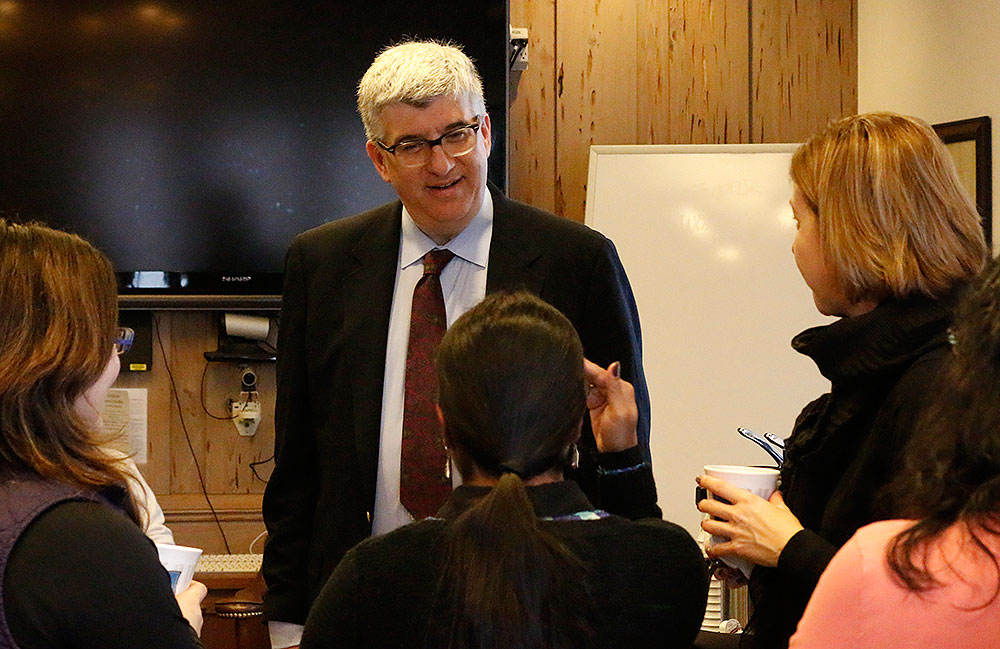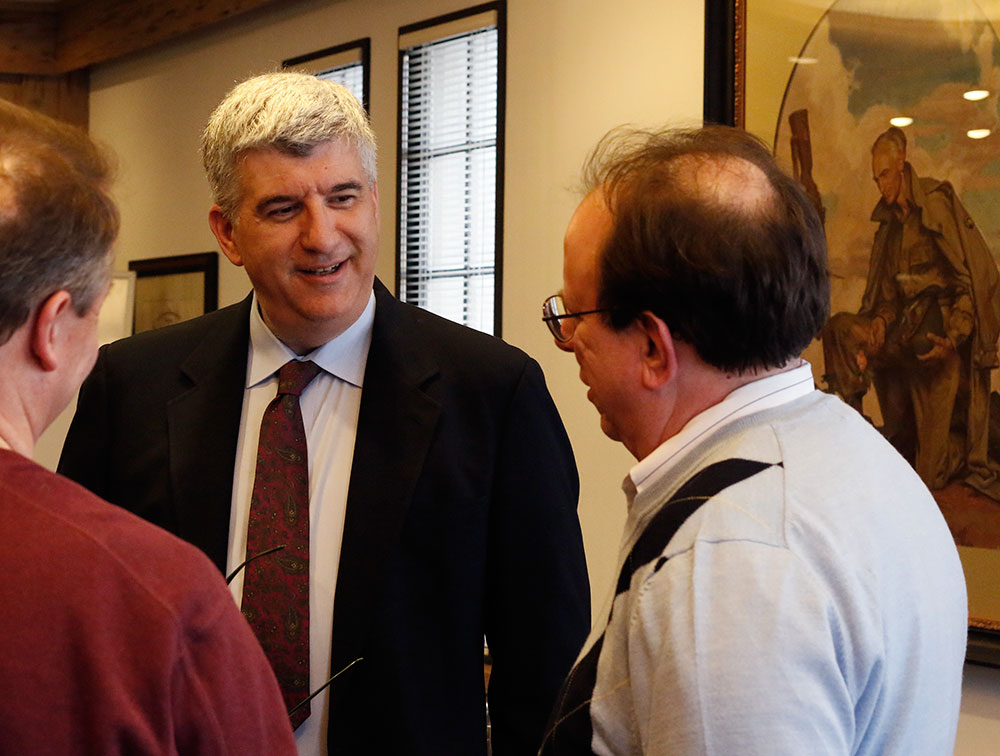Q&A: Meet Dean Shanahan

Students returning to campus last week weren’t the only ones getting their bearings as the new semester started. The Media School’s founding dean, James Shanahan, was here for more than a week learning all he could about the school he will lead beginning May 1.
Currently a professor and associate dean of the College of Communication at Boston University, Shanahan was named to the new post in December. While here this month, he has met with faculty, including committees formulating the new school’s curriculum; administrators in the College of Arts and Sciences, the Media School’s home; and staff in journalism, telecommunications and film studies, the units that comprise The Media School.
He also made time to chat with Media School reporter Megan Jula, a junior studying journalism. Here’s here recap of her Wednesday afternoon Q&A with Shanahan.
How are you enjoying Bloomington and Indiana University so far?
Everybody has been very nice and very hospitable. It has been a very easy transition. There’s a lot that is different, obviously, about the Northeast and the Midwest, but it’s all been very positive. The campus is beautiful and the town is very nice. I’ve been working in the College and the folks have all been very supportive. I’ve also met with the faculty of the new Media School.
What are the first items on your agenda for the Media School?
The major issues are curriculum, space, staffing and the budget. Those are the top four. They are all in progress. I don’t really officially start until May 1, so I’m kind of in a pre–exhibition season. I’ve just taken this opportunity to come here and meet people, and get to know the lay of the land, so that when I get here in May I can start more successfully.
How were you involved in forming the curriculum at the Boston University College of Communication?
The way curriculum is formed is it usually emerges from faculty discussions and their ideas about the direction that the curriculum should take. The job of an administrator is often to facilitate that and carry out the wishes of the faculty. That will be very similar here, too. At BU, the other job of the administrator is to let the faculty know when it is time to think about change. A curriculum can become outdated. It can change too fast. There are a lot of things that can happen to it one way or another that aren’t necessarily positive.

At BU, you were involved in creating the university’s diversity statement. Can you explain more about how you will bring that mindset to The Media School?
That was a very large-scale effort by the university. I was involved in that, I did not direct that. Folks from around the university were asked to participate in drafting a statement for the university about the philosophy of diversity and what that would be. Most universities have this in some way shape or form, so BU was stepping in to fill that gap. That involved not just thinking about a philosophical statement about diversity, but about what it would mean to actual decision making. It was an honor to be able to participate in that process.
I need to understand the atmosphere at IU in terms of where things are with those issues. I think IU is a very diverse university. I’ve seen already a good deal of attention to that issue here on campus. In terms of whether the school needs to catch up in the same way that BU did, that remains to be determined. But of course I would have the same level of support for the concepts of diversity. Particularly in the media world, this is a very important piece of the diversity puzzle. In terms of making sure images of different kind of people are represented, in terms of helping with issues of intercultural communication, certainly in the news we see that all the time.
Your background includes media research. Will you bring more emphasis on academic research to The Media School? How will you continue to support the skill-based aspects of the professions?
I see it as a balance, really. That’s the way it’s been in my career at Boston University, where we really tried to achieve a balance. You have a good number of students, particularly undergrad, who are interested in the skill-based component of a media education. They want to do it. They want to be a journalist, they want to be in television, they want to be in film, and we want them to find that here. By the same token, we don’t want to become a vocational school. We want to make sure that every student has exposure to the very diverse kinds of academic perspectives that are out there. I think that IU and the Media School already have a fairly healthy mix. So it’s my job to strengthen that and improve that.
What advantages will the collaborations within The Media School bring to students and teachers?
The media industries that we serve and study are converging, as we all know. That does not erase the identity of the traditional legacy media. But it presents a challenge. We have to have units in conversation with each other to parallel and match that convergence.
Take documentary film making as an example. Clearly there is an aspect of it that is a film making aspect. But also clearly there is an aspect of it that is a journalistic perspective. There are ways to study it that could come from many angles whether they are social science- or humanities-oriented. In other words, these are entities where boundaries are blurring. I think they are blurring in a good way. It’s probably much easier for you to watch documentary films now than it used to be, which means perhaps a magnified power of that particular genre.
What I want is for different people who have an interest in that particular form to be able to work with each other, communicate with each other, talk with each other, and of course for students to be able to cut across those boundaries as well. To boil it down to one sentence, it’s really that media convergence needs to be matched by a certain level of curricular and scholarly convergence.
What messages do you have for alumni and students who are apprehensive about the new Media School?
My message is for them to keep an eye on us and see how we do. My hope is that they will be pleased with what we do, that we strengthen what they remember of their education here. And if they see it going in a direction that they don’t like, then we need to hear from them. I think the stronger their communication with us, the better we will do, the better we will understand the scope and impact of the decisions we make, and whether we go too fast or too slow
What is your response to journalism alumni who are fearful of losing autonomy?
Any kind of change has trade-offs. Perhaps in this case, if there is a perceived loss of autonomy, the trade-off there will be increased access to resources in a school with a larger scope, the benefit of being part of something with a higher level of prominence both within the university and within the alumni community, around the country and around the world. The school should have net benefits for the journalism program, which is not going away by any means. There are administrative kinds of benefits from being in a larger program. Those should be of service to the overall goal of a journalism student, faculty or alumnus.
What collaborations do you foresee with The Media School and with the College of Arts and Sciences?
The Media School is an integral part of the College. It’ not just a collaboration between two independent units. The school is really conceived of as an integral part of the evolution of the college. I’m very excited about that. I think that the dean of the college has been very helpful in that and in articulating that vision for me.
Does the term “founding dean” add a certain sense of responsibility to your position?
The title “dean” itself has a sense of responsibility, and then when you add “founding” to it, that’s quite an opportunity. Certainly, it is an honor. It adds a measure of the sense of the fact that this is a new school. This is a major investment of the university. This is intended to be a really important historical change for the study of media here. So all of those things are definitely on my mind.
More:

